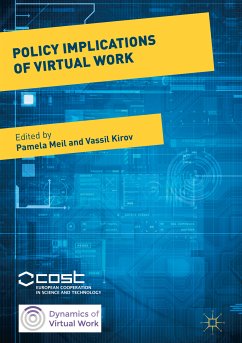The authors of the chapters analyse the ways in which processes of digitalization leading to virtual work impact so many aspects of our lives: the way we buy, sell, network, communicate, participate, create, consume, and, of course, the way we work. In turn they focus on the subsequent implications for the future of work as well as the viability of existing social protection systems.
The developments examined here are salient for both policy stakeholders and for the academic community in areas such as labour sociology, industrial relations, gender studies, political economy, and economic geography.
Dieser Download kann aus rechtlichen Gründen nur mit Rechnungsadresse in A, B, BG, CY, CZ, D, DK, EW, E, FIN, F, GR, HR, H, IRL, I, LT, L, LR, M, NL, PL, P, R, S, SLO, SK ausgeliefert werden.









